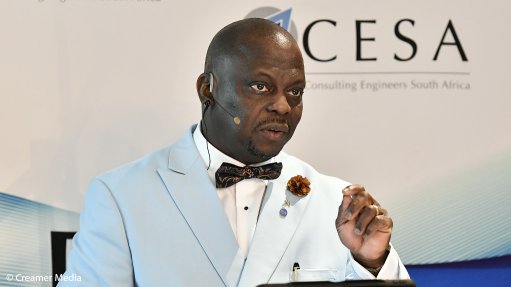
Cesa president Olu Soluade
Photo by: Creamer Media Chief Photographer Donna Slater
Consulting Engineers South Africa (Cesa) has expressed some reservations with a proposal that a National State of Disaster be declared to tackle South Africa’s long-running electricity crisis.
While not rejecting the proposal entirely given the urgent need to address the “serious crisis”, CEO Chris Campbell cautioned that “people with ill-intent” could abuse the declaration, as was the case when a State of Disaster was implemented during the Covid pandemic.
“Should we go down that path, what controls and oversight will be in place to make sure that there is no abuse of that situation?” he said in response to a question posed at an event convened for Cesa president Olu Soluade to deliver the voluntary association’s annual presidential address.
“We certainly need to create a sense of urgency … but we need to put in place the controls and oversight to make sure that it doesn't become an opportunity for abuse.”
Campbell expressed support for the short-, medium- and long-term plans that had started to emerge out of the National Energy Crisis Committee, or NECOM, which he said had been formulated with the support of various engineers, who had provided input either through engineering associations or through organised-business and company structures.
“A huge amount of knowledge and research has gone into breaking the plan up into bite-size bits, as opposed to promising all of it in the next six months.”
He stressed, however, that resolving the loadshedding crisis was not a technical challenge alone and would also require various regulatory and social interventions, including intensified efforts to address criminality and sabotage.
In his address, Soluade said Cesa members stood “ready to commit to making a difference” in addressing both the energy and infrastructure challenges, which were “stretching our resilience to the maximum”.
“We are calling on government to commit to increased and informed spending on infrastructure as a key economic driver.
“Government needs to overcome the current supply-chain and procurement issues as well as the skills challenges our country faces. Additionally, the pace at which this happens needs to be accelerated,” Soluade asserted.
He argued that pending public procurement legislation also needed to make a clear distinction in the way the procurement of infrastructure was treated relative to the purchase of general goods and services.
The Public Procurement Bill, he indicated, offered the opportunity for a “fundamental shift in principle and in law to ensure that value for money was equated to the quality of services procured in the infrastructure delivery process”, rather than a least-cost approach.
“We believe that the correct approach should be to include the total cost of lifecycle ownership – cheap simply does not last and puts lives at stake.
“The impact of an inadequate design, that only equates to two percent of the lifecycle cost of a project, can have a catastrophic impact on operations and maintenance costs, that equate to approximately 60% to 70% of the total lifecycle cost, over the pursuant 30 years.
“What our country is currently experiencing is the results of years of inadequate supply-chain and procurement management focused on least cost procurement,” he argued.